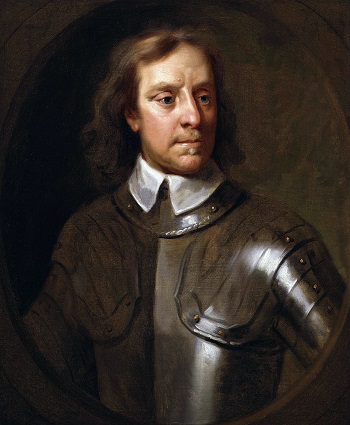But with the consciousness of failure in realizing his ideal of government the charm of government was gone.
Continuing Of Cromwell’s Rule In England and the Restoration
with a selection from On Heroes, Hero-Worship, and The Heroic in History by Thomas Carlyle published in 1841. The selections are presented in a series of ten easy 5 minute installments.
Previously in Of Cromwell’s Rule In England and the Restoration.
Time: 1649-1660
Place: Great Britain

Public domain image from Wikipedia.
But with the consciousness of failure in realizing his ideal of government the charm of government was gone; and now to the weariness of power was added the weakness and feverish impatience of disease. Vigorous and energetic as Cromwell’s life had seemed, his health was by no mean as strong as his will; he had been struck down by intermittent fever in the midst of his triumphs both in Scotland and in Ireland, and during the past year he had suffered from repeated attacks of it. “I have some infirmities upon me,” he owned twice over in his speech at the reopening of the Parliament in January, 1658, after an adjournment of six months; and his feverish irritability was quickened by the public danger. No supplies had been voted, and the pay of the army was heavily in arrear, while its temper grew more and more sullen at the appearance of the new constitution and the reawakening of the royalist intrigues.
Cromwell had believed that his military successes would secure compliance with his demands; but the temper of the Commons was even more irritable than his own. Under the terms of the new constitution the members excluded in the preceding year took their places again in the House; and it was soon clear that the Parliament reflected the general mood of the nation. The tone of the Commons became captious and quarrelsome. They still delayed the grant for supplies. Meanwhile, a hasty act of the Protector in giving to his nominees in “the other House,” as the new second chamber he had devised was called, the title of “Lords,” kindled a strife between the two Houses which was busily fanned by Haselrig and other opponents of the government. It was contended that the “other House” had under the new constitution simply judicial, and not legislative, powers. Such a contention struck at once at Cromwell’s work of restoring the old political forms of English life: and the reappearance of parliamentary strife threw him at last, says an observer at his court, “into a rage and passion like unto madness.”
What gave weight to it was the growing strength of the Royalist party, and its hopes of a coming rising. Such a rising had in fact been carefully prepared; and Charles, with a large body of Spanish troops, drew to the coast of Flanders to take advantage of it. His hopes were above all encouraged by the strife in the Commons, and their manifest dislike of the system of the Protectorate. It was this that drove Cromwell to action. Summoning his coach, by a sudden impulse, the Protector drove on, February 4th, with a few guards to Westminster; and, setting aside the remonstrance of Fleetwood, summoned the two Houses to his presence. “I do dissolve this Parliament,” he ended a speech of angry rebuke, “and let God be judge between you and me.”
Fatal as was the error, for the moment all went well. The army was reconciled by the blow leveled at its opponents, and a few murmurers who appeared in its ranks were weeded out by a careful remodeling. The triumphant officers avowed to stand or fall with his highness. The danger of a Royalist rising vanished before a host of addresses from the counties. Great news, too, came from abroad, where victory in Flanders, and the cession of Dunkirk in June, set the seal on Cromwell’s glory. But the fever crept steadily on, and his looks told the tale of death to the Quaker, Fox, who met him riding in Hampton Court Park.
“Before I came to him,” he says, “as he rode at the head of his lifeguards, I saw and felt a waft of death go forth against him, and when I came to him he looked like a dead man.” In the midst of his triumph Cromwell’s heart was heavy in fact with the sense of failure. He had no desire to play the tyrant; nor had he any belief in the permanence of a mere tyranny. He clung desperately to the hope of bringing over the country to his side. He had hardly dissolved the Parliament before he was planning the summons of another, and angry at the opposition which his council offered to the project. “I will take my own resolutions,” he said gloomily to his household; “I can no longer satisfy myself to sit still, and make myself guilty of the loss of all the honest party and of the nation itself.” But before his plans could be realized the overtaxed strength of the Protector suddenly gave way.
| <—Previous | Master List | Next—> |
Thomas Carlyle begins here. John R. Green begins here. Samuel Pepys begins here.
More information here and here, and below.
We want to take this site to the next level but we need money to do that. Please contribute directly by signing up at https://www.patreon.com/history

Leave a Reply
You must be logged in to post a comment.